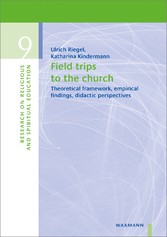Suchen und Finden
Service
Mehr zum Inhalt

Field Trips to the Church - Theoretical Framework, Empirical Findings, Didactic Perspectives
Buchtitel
1
Imprint
4
Preface
5
Table of Contents
7
Chapter 1: Theoretical Background
9
1 Germany: Compulsory Denominational Religious Education in a Religiously Individualized Society
9
1.1 Religious Plurality in a Secularized Context
10
1.2 Religious Education in German State Schools
12
1.3 The Problem of Religious Experience in Scholastic Religious Education
14
2 Performative Religious Education
16
2.1 The Concept of Performative Religious Education
17
2.2 Didactics of Performative Religious Education
19
3 Kirchenraumpädagogik
21
3.1 Pedagogical Principles
22
3.2 Didactic Principles
23
3.3 Characteristic Tour Setups
25
4 Summary and Preliminary Research Questions
27
Chapter 2: Design of the Study
29
1 Empirical Findings on Field Trips
29
1.1 Opportunities
30
1.2 Challenges
30
1.3 Field Trips to the Church
31
1.4 Conclusion
32
2 Field Trips to the Church According to the Contextual Model of Learning
33
2.1 Theoretical Framework
33
2.2 Adaption to Field Trips to the Church
35
2.3 Conclusion
37
3 Conceptual Model
38
4 Design
41
4.1 Sequence “Church – Community and Building”
41
4.2 Unit 3 and Unit 5: Field Trips vs. Classroom Instruction
43
4.3 Empirical Design
47
5 Sample
50
Chapter 3: Knowledge about the Church Building
53
1 Theoretical Background and Research Questions
53
2 Concept
56
3 Instrument
57
4 Methods of Data Analysis
59
5 Results
61
6 Summary
63
Chapter 4: Attitude towards the Church Building
65
1 Theoretical Background and Research Questions
65
2 Concept
68
3 Instrument
70
4 Methods of Data Analysis
70
5 Results
73
6 Summary
74
Chapter 5: Situational Interest
77
1 Theoretical Background and Research Questions
77
2 Concept
79
3 Instrument
81
4 Methods of Data Analysis
82
5 Results
83
6 Summary
86
Chapter 6: Students’ Emotions on Visits to the Church Building
87
1 Theoretical Background and Research Questions
87
2 Concept
90
3 Instrument
91
4 Methods of Data Analysis
92
5 Results
93
5.1 Affective Assessment
93
5.2 Reference to Transcendence
94
5.3 The Effects of the Dispositional Variables
95
6 Summary
97
Chapter 7: Teachers’ Evaluation of Field Trips
99
1 Theoretical Background and Research Questions
99
2 Instrument
101
3 Methods of Data Analysis
101
4 Results
103
4.1 Didactic Perspectives on Field Trips to the Church
103
4.2 Religious Perspectives on Field Trips to the Church
107
5 Summary
111
Chapter 8: Discussion
113
1 The Students’ Perspective on Field Trips
114
2 The Teachers’ Perspective on Field Trips
116
3 The Effects of Field Trips to the Local Church
118
3.1 The Students’ Perception of the Church Building
118
3.2 Effects on the Students’ Knowledge
119
3.3 Effects on the Students’ Attitude
122
3.4 Effects Related to the Students’ Religious Background
124
4 Limitations
125
Chapter 9: Didactic Perspectives
129
1 The General Setup for Successful Field Trips
129
1.1 The Power of Visits to the Local Church
129
1.2 The Importance of Familiarity with the Local Church
131
1.3 The Chances of Kirchenraumpädagogik
132
1.4 The Compensatory Power of Field Trips
133
1.5 Meaningful Learning is also Possible Inside the Classroom
135
2 Methodic Perspectives to Explore the Local Church
136
2.1 Start from the Outside
136
2.2 Work with the Auratic Dimension and the Spiritual Dimension of the Church Building
137
2.3 Slow Down and Take Your Time
138
2.4 Activate the Students and Give Them the Freedom to Experience the Church
139
2.5 Employ Multi-Sensory Methods Inside the Classroom
140
Summary
143
References
149
Appendix: Student Questionnaire (Pretest)
163
Alle Preise verstehen sich inklusive der gesetzlichen MwSt.







